97% of companies acquire an IoT platform to customize it

Today the Internet is everywhere, it has become an indispensable element in the daily life of society, keeping people connected at all hours. Although this advanced level of connectivity has been so good for so many, it also brings new challenges to face. And that’s the point where the Internet of Things (IoT) is located, changing the way many organizations do business.
It seems that now companies are starting to discover how powerful an IoT tool can be. However, realizing that IoT can be a powerful tool is one thing, successfully implementing and integrating it into the business is another.
In addition, companies must take on another challenge, which is, they must choose between purchasing an IoT platform or trying to build their own. Buying a platform will mean committing to an IoT provider, but what does this really mean for organizations in terms of who-does-what in their IoT implementation strategy?
The goal of companies
When it comes to deploying IoT initiatives and solutions, it seems that many organizations are not yet where they would like. This may explain why the implementation, management and expansion of IoT is an important initiative for almost all organizations (98%). According to the study conducted by Vanson Bourne “IoT – the platform forsuccess”, for a quarter (25%) is simply the most important initiative, even above boosting production capacity (16%), increasing revenue (12%) or launching new products or services (9%).
While this may initially seem bizarre, IoT implementation is likely to be a priority ahead of increasing revenue. In reality, the two issues are closely linked to companies. In fact more than four in ten (43%) are implementing IoT strategies to increase revenue. This is not the only goal for IoT adoption, improving operational efficiency (50%), increasing productivity (44%), or optimizing operations (41%), are other objectives.
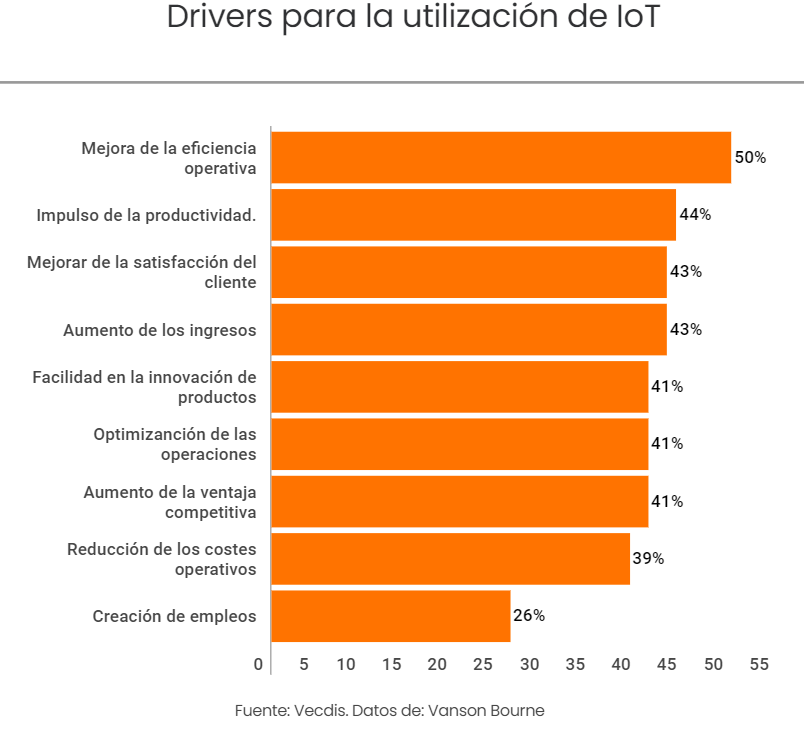
It’s not just revenue growth where companies see IoT as a positive strategy, it also has a close relationship with customer satisfaction. More than four in ten (43%) report that your organization is implementing IoT initiatives to improve customer satisfaction, and around the same percentage (39%) is seeing this improvement as a direct result of IoT implementation. The message is clear, IoT implementation can directly affect the part of the business that belongs to the customer, as well as the opposite end, which affects only the company.
While all seeming benefits, there may also be parts of IoT implementation that are an obstacle to organizations, nine out of ten (90%) report that they did encounter barriers, which slowed the implementation and expansion of IoT. The challenge is: overcoming barriers and being able to enjoy great benefits over time.
Likewise, the 90% agrees that the implementation and effective management of the IoT, can position their company above their competitors. Therefore, IoT can no longer be ignored if a company wants to remain competitive, for this it needs to set goals that encourage you to overcome barriers effectively.
Buy or build?
Once the need to implement an IoT platform in companies has been decided, they must make another fundamental decision To acquire an external platform or build their own?
Almost all organizations (97%) work with a vendor to achieve the implementation of a platform, only a 2% has been encouraged to build a completely own internal solution. An example of such providers is Cyprees, and their IoT solution: Arm Mbed Cloud.
Despite the large number of companies that have suppliers, only the 4% decide to take full care of IoT implementation. Which means, therefore, that most (93%) use a hybrid approach to IoT implementation, such as buying an IoT platform from an external vendor and then building on and customizing it. This makes sense, as it allows organizations the flexibility needed within a reliable platform.
The choice of a hybrid deployment is based primarily on the lack of Tools and IoT experts that allow them to build a platform entirely. Three out of ten companies claim a lack of internal expertise, 29% say they lack tools to manage and process large volumes of data, and the 28% find legacy systems a barrier to effective IoT deployment.
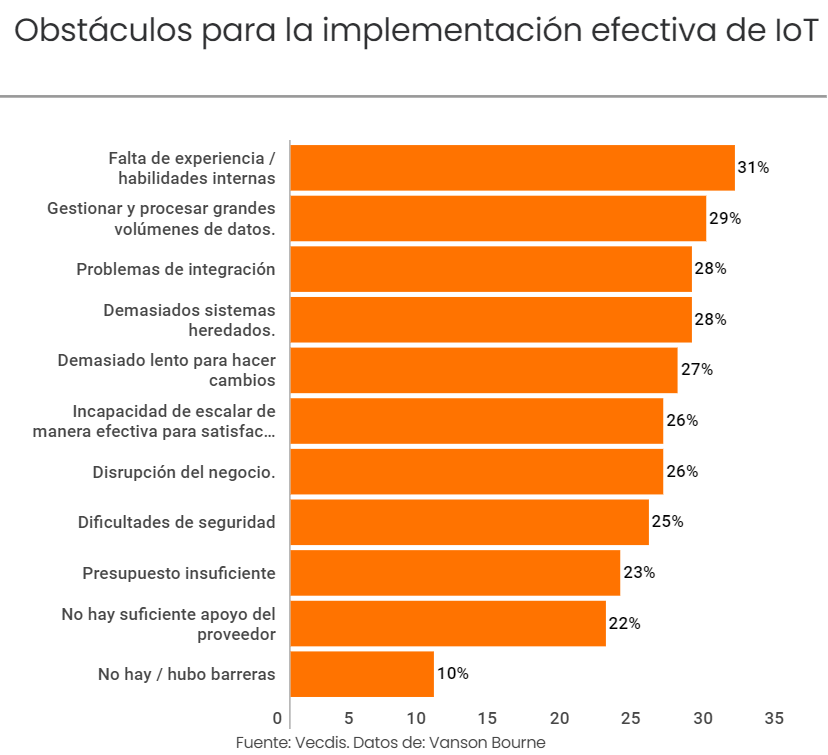
However, in contrast, many companies do not seem to be able to get what they need from a solution made entirely by a supplier, seeing the very low percentage of this type of implementation. When companies are looking for the best option for their business, they look for someone innovative (46%), who offers a solution that can be easily integrated across the organization (40%), and that suits their needs (39%).
And it is this last requirement that gives a clue as to why so many companies prefer a customizable platform. Organizations are caught between two needs, they need a tailor-made solution that meets their exact specifications, but they lack the ability to create it themselves. This leads to the need to acquire a basic platform that allows customization and has flexibility.
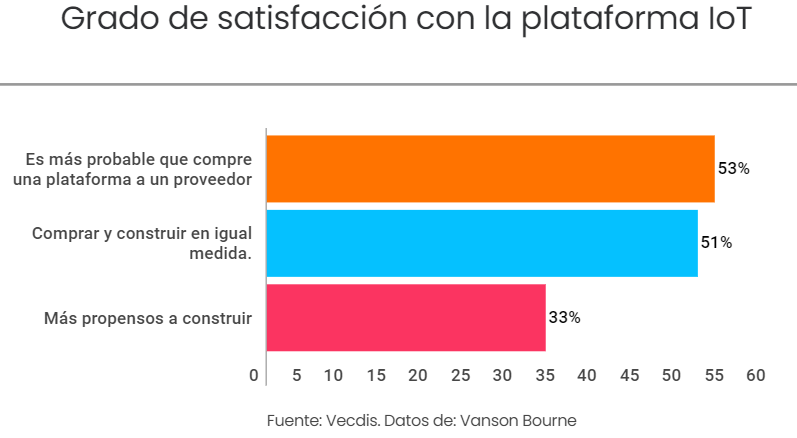
The 53% of the companies are extremely satisfied with their acquired platform, compared to 33% of those who built their internal platform. This reinforces the idea that many organizations simply do not have the configuration to build an IoT platform. Despite that satisfaction, 72% of the companies feel that their supplier is not doing enough.
However, despite this mistrust, nearly 50% of the organizations that bet on acquiring an IoT platform from a vendor claim to make a profit, such as improving reliability (49%) or improving security (48%).
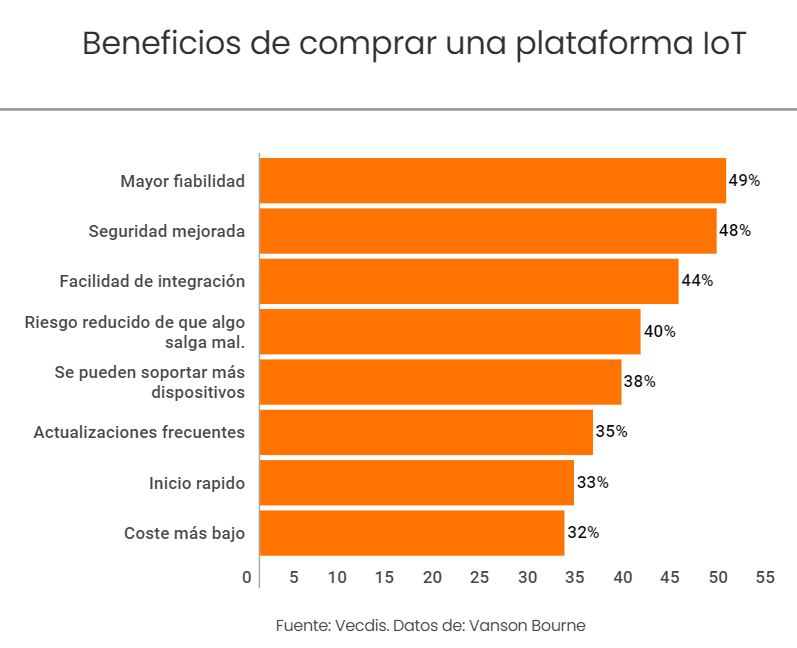
Success is being forged
As for global connectivity and the importance of the Internet, everything points to people becoming more connected and therefore more connected, which will cause the importance of the Internet to increase in the future.
A brave person is one who bets on different connectivity and it is clear that for organizations this thought works the same. This is reflected in the urgency of implementing immediate IoT plans in organizations, for many, the next 12 months will be a revolution, rather than merely an evolution.
According to market research firm IDC, IT spending on cutting-edge infrastructure will reach up to 18% of total IoT infrastructure spending by 2020. That expense is driven by the deployment of converged IT and OT systems that reduce the time for the value of data collected from your connected devices.
For the 29% thawing organizations to see their IoT platform at the forefront of other platforms, it puts them one step ahead of the competition. Interestingly, it is the companies that have purchased their IoT platform that are most likely to support this view (36% vs. 20%). This raises the question: do companies come to sellers because of the importance of IoT for the future, or are they adopting IoT platforms within their organization because they have the confidence to have a supplier behind them?
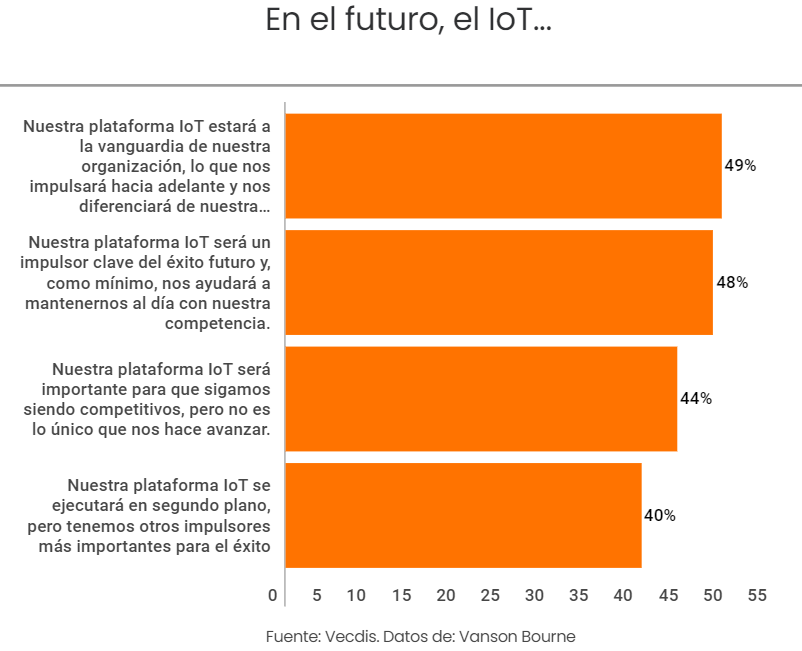
Either way, by accepting their limitations, finding the right provider, and freeing themselves from internal IT burdens, organizations will stand out in a brighter and more competitive future thanks to IoT.
However, there is still work to be done. Despite these hopes for the future, nearly nine out of ten (89%) feel that their organization needs to improve its future IoT plans. And some organizations can’t even have the luxury of being able to think too much about the distant future; more than a quarter (26%) of companies say they need to improve their IoT platform right now, versus the 11% thinks it’s not.
In addition, only a quarter (25%) of organizations think their organization’s IoT platform will be much more advanced in the next 12 months. Given how strong IoT has been committed for a promising future, perhaps this can be taken as a signal that improvements and evolution of IoT platforms can take more than a year to , despite the rapid growth of this technology.
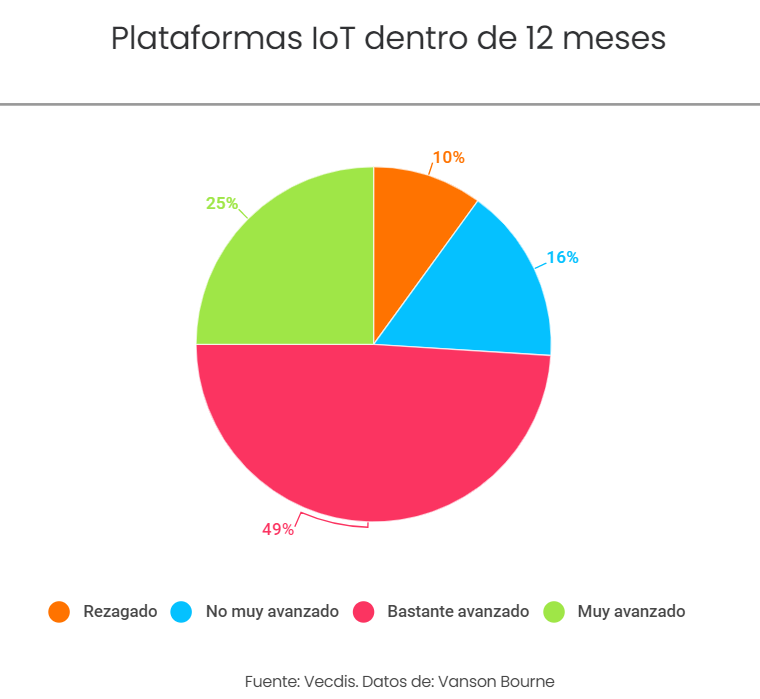
Revealingly, organizations that have built their own IoT solution are even less likely (16%) to believe they can achieve a high level of advancement, compared to the 28% that are buying a platform.
Conclusions
Implementing IoT technology within an organization is not a short-haul decision, but a cross-cutting career. Building or buying a platform and then trying to customize it and modify it internally takes time.
This is because a really out-of-the-box solution isn’t giving organizations what they really need, flexibility, scalability, or any of the multitude of different capabilities and options that exist within IoT. And that is before even considering the constant change of the business, social and political landscape that is being lived.
Regardless of the approach you select,many organizations are not located where they should be. Some are already lagging behind and others do not stand up to their competitors and have little hope of regaining that lost ground in the next 12 months.
However, in a race with few clear winners there is always an opportunity for even the most backward to catch up. And choosing the right IoT platform is the first step. Trying to be self-sufficient apparently leaves organizations without the confidence to know how to continue to future success with IoT, as they are held back by their own limitations.
Therefore, laying the foundation for future blossom should be the motto of all organizations, or can any organization afford to ignore this lesson?


